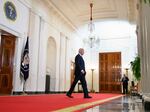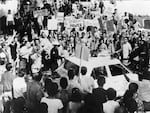
President Biden walks through the Cross Hall of the White House on July 1, 2024.
Mandel Ngan/AFP via Getty Images / AFP
President Biden has said he has no intention of stepping back from his bid for a second term — even though some in his party have asked him to reconsider.
After he struggled to debate former President Donald Trump last month, many Democrats have said they think Biden, 81, will lose in November to his Republican rival. Biden has been working to show he is still vigorous and capable, but that hasn’t quieted the calls for him to drop out.
Biden told Democratic lawmakers that he had received 87% of the votes in the primaries and had almost 3,900 delegates. "I'm the nominee of this party because 14 million Democrats like you voted for me in the primaries," he told a rally in Detroit on Friday.
"You made me the nominee. No one else. Not the press, not the pundits, not the insiders, not the donors," he said. "And I'm not going anywhere."
At his recent press conference, Biden was asked about a potential challenge at the convention, if delegates have second thoughts.
“Obviously, they're free to do whatever they want, but I get overwhelming support,” Biden said. “And so tomorrow, if all of a sudden, I show up at the convention, everybody says ‘we want somebody else,’ that's the democratic process.”
But it’s not actually that simple.

President Biden speaks during a campaign event at Renaissance High School in Detroit, Mich., on July 12.
Mandel Ngan/AFP via Getty Images / AFP
Here’s what the rules say about a challenger at the convention
At this point, President Biden is the only person qualified for the nomination, according to the Democratic National Committee.
Under DNC rules, requests to nominate a candidate must be presented in writing and include written approval from the proposed nominee – as well as a petition with signatures from at least 300 convention delegates.
While there has been a lot of speculation that leaders like Vice President Harris or any of a bench of younger Democratic governors could be replacements for Biden, at this point no candidates have stepped forward to challenge him, and they have all said they are backing the president.
Delegates to the convention are currently “bound” to Biden because he handily won the primaries and caucuses earlier this year. And while Biden said they are free to do whatever they want, the DNC rules say “all delegates to the National Convention pledged to a presidential candidate shall in all good conscience reflect the sentiments of those who elected them.”
Bound delegates breaking against the presumptive nominee to 'vote their conscience' has never before been tested.

The New York Times editorial board, along with many of its highest-profile opinion columnists, called for President Biden to leave the race after the June 27 debate. The editorial board described Biden as "the shadow of a great public servant."
Chris Delmas/AFP via Getty Images / AFP
Another complicating factor: a plan announced by the Democratic National Committee long before Biden’s disastrous debate to do a virtual roll call vote sometime before the convention.
The DNC originally had made that decision to get around a deadline in an Ohio law to get the nominee on the November ballot. But now, it means delegates are expected to vote virtually well before the start of the convention on Aug. 19.
Two DNC committees are slated to meet July 19 and July 21 to finalize this plan and set a date for the virtual vote. But what this would likely mean is that by the time delegates show up at the convention hall in Chicago in August, Biden will already officially be the nominee.
But what if Biden voluntarily steps aside?
If Biden decided to drop out, that would set off a series of events not seen in more than 50 years.
The party would then be headed for an open convention that could go to multiple rounds of voting if Democrats – and more importantly, convention delegates – don’t coalesce behind a single candidate before they convene in Chicago on August 19.
The convention could be preceded by something resembling a highly accelerated presidential campaign where the voters being wooed are the approximately 4,700 convention delegates. The delegate voting process is spelled out in Democratic party rules.
“You might not really know where it was going until we actually got to the convention and the delegates actually got there,” said Kamarck.

A woman wears a North Carolina delegate button during a campaign event with Vice President Harris on July 11, 2024 in Greensboro, N.C.
Sean Rayford/Getty Images / Getty Images North America
For people who have spent their lives voting in primaries and having those votes decide their party’s nominee, this may seem undemocratic. But, there’s actually nothing in the U.S. Constitution about how candidates are chosen.
At the convention, each candidate would be allowed 20 minutes of supporting speeches from the people nominating and seconding them – and then there would be a roll call vote by states, in alphabetical order.
The delegates voting would include those previously pledged to Biden as well as about 700 so-called ‘superdelegates’, which include members of the Democratic National Committee, Democratic governors, members of Congress and even former presidents. There could be many rounds of voting until a majority was reached.
‘Reality TV like you can't imagine’
Conventions have been relatively suspenseless affairs since the 1968 Democratic convention in Chicago. Starting with the 1972 election, party rules were changed to shift the power to pick the nominee from party power brokers to voters whose preferences are logged months before the convention.
The rules were adjusted again after the contentious 2016 Democratic primary to further dilute the influence of party leaders in favor of the preference of voters.
An open convention would be “reality TV like you can't imagine,” said Elaine Kamarck, a senior fellow at the Brookings Institution and a DNC member. “But there is a procedure for doing it right. There's a procedure for running conventions that's well over 200 years old.”

A police officer escorts a protestor to a squad car surrounded by dozens of anti-Vietnam War demonstrators outside the 1968 Democratic National Convention in Chicago. (Photo by Hulton Archive/Getty Images)
Hulton Archive/Getty Images / Hulton Archive
Essentially, she says, this is a return to a process that started in 1831 with the first convention and lasted through 1968. That year, President Lyndon B. Johnson dropped out early, in the face of anti-Vietnam war sentiment that was sinking his candidacy.
Then, while the primary was still underway, Robert F. Kennedy was assassinated, leaving Vice President Hubert Humphrey to battle it out with anti-war Senator Eugene McCarthy.
Humphrey came into the convention with the majority of delegates and left as the Democratic nominee, but the convention put an ugly intraparty battle on display with protests inside and outside the convention hall.
“Lots of voters tuned in to these conventions because it was only at the conventions that you saw the real drama,” said Kamarck.
Republican Richard Nixon won the election that November and Democrats instituted a series of reforms to the nominating process to give regular voters more say.
Copyright 2024 NPR